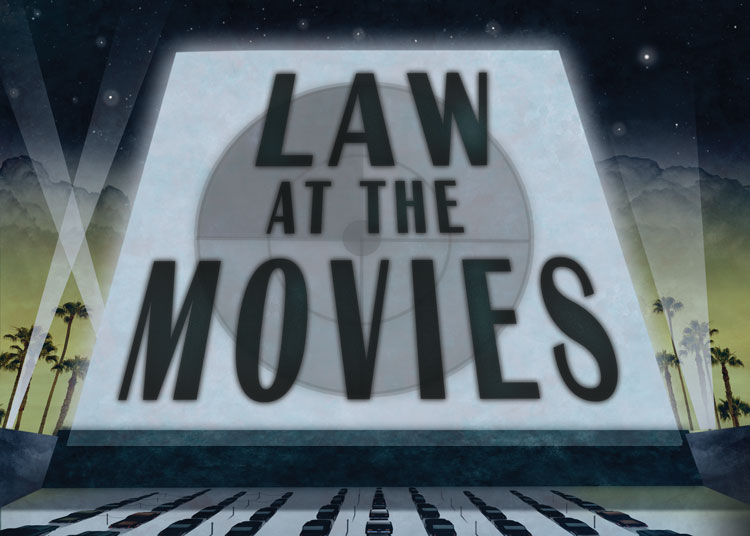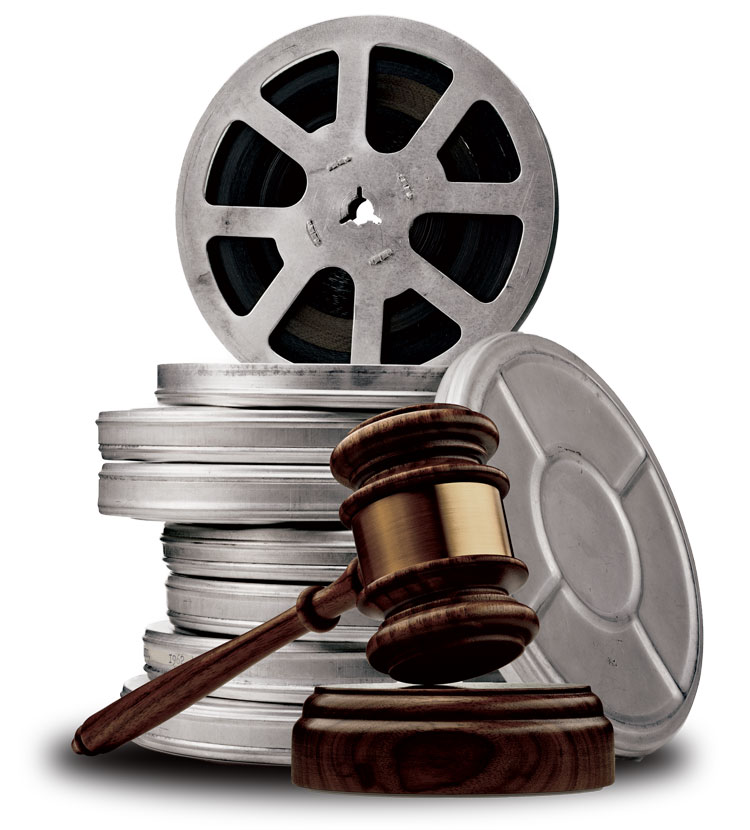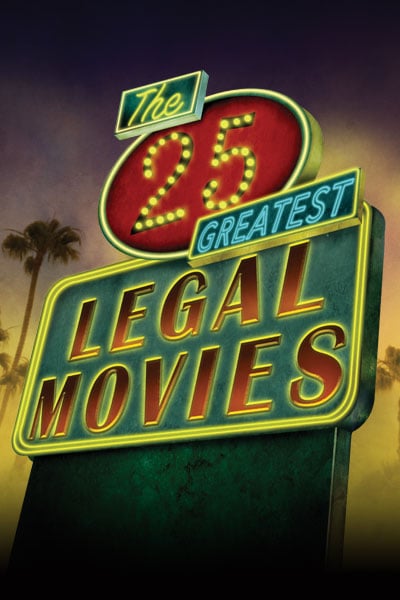The 25 greatest legal movies

Illustration by Matt Mahurin
Our all-time list of cinematic favorites
Ten years ago, the ABA Journal published a cover story called “The 25 Greatest Legal Movies,” a roster of top-notch legal-themed films drawn from a panel of judges that included lawyers, law professors and, yes, an actual judge.
We wanted to update the list this year and decided to broaden the scope to consider films that tell stories outside the typical courtroom drama—films that examine how the legal system intersects with our lives in different ways.
Once again, we’ve asked a panel to weigh in and recommend their favorite legal-themed films, including those released in the decade since our last top-25 list. The judges voted for many of the classics from our 2008 list, along with some newer films we hope will get you thinking about the reach of the law in new ways.
Notes and Observations from Our Judges
FAILURES MAKE FOR GOOD MOVIES

Photographs by Miguel Garcia Saavedra/Studiosmart/Shutterstock.com
Michael Asimow, visiting professor at Stanford Law School, co-author with Paul Bergman of Reel Justice: The Courtroom Goes to the Movies, co-author of Law and Popular Culture: A Course Book and editor of Lawyers in Your Living Room! Law on Television.
Believers in the adversary system think that the best we can do is procedural justice. We can never know the truth about what happened in the past. But pop culture consumers expect substantive justice—that the truth is revealed, bad guys have to pay righteous damages, the guilty are convicted and the innocent walk free. So my favorite legal movies are those in which the adversary system fails miserably to deliver substantive justice.
Our all-time list of cinematic favorites
FAVORITE CROSS-EXAMINATIONS
Paul Bergman, professor of law emeritus, UCLA, co-author of Reel Justice: The Courtroom Goes to the Movies.
Cross-examination is the most distinctive feature of a U.S. trial. The potential for mano a mano combat that often produces drama, humor and sudden plot shifts helps to explain why courtroom films are popular in countries in which oral adversary trials are unknown.
Some great examples of cross-examination:
- Young Mr. Lincoln (1939) Lincoln’s famous almanac cross-examination illuminates a killer’s identity.
- Anatomy of a Murder (1959) A pie-in-the-face answer dooms a prosecutor who asks one question too many.
- Inherit the Wind (1960) Defense lawyer Clarence Darrow and William Jennings Bryan try to make a monkey of each other.
- Bananas (1971) A bound-and-gagged pro se defendant demonstrates the power of cross-examination—at least as it is often portrayed in films.
- My Cousin Vinny (1992) Just as the Harlem Globetrotters can have fun and win basketball games, Vinny can create comedy while turning into a great cross-examiner when the game is on the line. It helps that the prosecutor goes all Washington Generals when he cross-examines Vinny’s fiancee.
- The Verdict (1982) The cross-examination of an admitting-room nurse unlocks the hitherto unrealized potential for drama in the best evidence rule.
MOVIES THAT INSPIRE
Ron Klain, former chief of staff for Vice Presidents Al Gore and Joe Biden and former senior White House aide to President Barack Obama.
His choices this year include 12 Angry Men, Inherit the Wind, A Man for All Seasons and the more recent Loving.
All of these provide inspiration for me, particularly in these times. These films show how lawyers can fight bias, prejudice and ignorance with facts and a dedication to the rule of law; how they can stand up to authority and popular opinion; and the need for patience and persistence in tackling such battles. Above all, they show lawyers overcoming incredible odds to prevail for these values—as relevant today as when these films were set.
REELING OVER RUTH BADER GINSBURG
Judge Beth Bloom, U.S. District Court, Southern District of Florida
While I enjoyed Loving, the Lincoln Lawyer and Spotlight, my favorite movie is RBG, and here is why: As a relatively young woman and judge who credits the opportunities I have been given to the strong women before me who have fought and paved the way, Justice Ginsburg is my real-life superhero. She has dedicated her entire legal career to the pursuit of gender equality. The movie gives the viewer, through the retelling by other strong women and men, an intimate insight into her brilliant and strategic manner of framing issues argued before the Supreme Court. The documentary gives you a rare view of her deep relationships with others and her tremendous commitment to the law. She is notorious not because of the opinions she has authored but because of the tremendous life that she has led. It is a movie I was excited to take my 12-year-old daughter to see and one that women and men—young and old—should experience.
Our all-time list of cinematic favorites
ANOTHER RBG FAN
William Treanor, dean of the Georgetown University Law Center.
RBG is an illuminating, moving, funny and inspiring documentary about Justice Ginsburg and the way in which her profound commitment to justice has shaped her career and the law—and made her a cultural icon: “the Notorious RBG.” The movie traces her extraordinary career, highlights the gender injustices she has fought, and vividly brings to life both her friendship with Justice Antonin Scalia and her marriage to professor Marty Ginsburg, with his dedication to supporting her career and his great sense of humor. Plus, it has exercise tips!
FAVORITE FIRST AMENDMENT FILMS
Kevin Davis, assistant managing editor, ABA Journal, author of The Wrong Man, Defending the Damned and The Brain Defense: Murder in Manhattan and the Dawn of Neuroscience in America’s Courtrooms.
At a time when some in power have called the press “the enemy of the American people,” two recent films underscore that if not for a free press, the people would be in the dark about the darkest secrets that those in leadership would prefer to remain hidden. Spotlight tells the story of how a relentless team of reporters at the Boston Globe uncovered a decades-long pattern of sexual abuse of boys by Roman Catholic priests, an investigation that led to lawsuits and criminal charges. The Post is about the behind-the-scenes struggle at the Washington Post over whether to publish details from the top-secret Pentagon Papers, leaked documents that revealed how the U.S. was failing in the Vietnam War. These movies show how the Fourth Estate and the First Amendment can be powerful allies in exposing uncomfortable truths and holding those in power accountable.
SIZZLING SELECTIONS FROM A BEST-SELLING CRIME WRITER
Linda Fairstein, former prosecutor and best-selling crime novelist, offers her picks:
- 12 Angry Men—A terrific drama, but there isn’t a prosecutor alive who wants his or her jurors to see it on the eve of a trial.
- Presumed Innocent—The unthinkable! A sex crimes prosecutor is murdered! One of those movies I think is as good as the book, and the Scott Turow book is a superb courtroom drama. One of the first movies to have DNA as a major plot point.
- Body Heat—One of the finest noir films ever made, and a brilliant primer on estate planning and the importance of hiring a good lawyer.
- Anatomy of a Murder—From a best-selling novel written by a Michigan trial court judge, the defense strategy leads to a brilliant twist at the end. Great cast and riveting court scenes—all set to a Duke Ellington score.
- Judgment at Nuremberg—This one is as chilling today as when it first debuted; the war, the law and history in a powerful piece of filmmaking.




